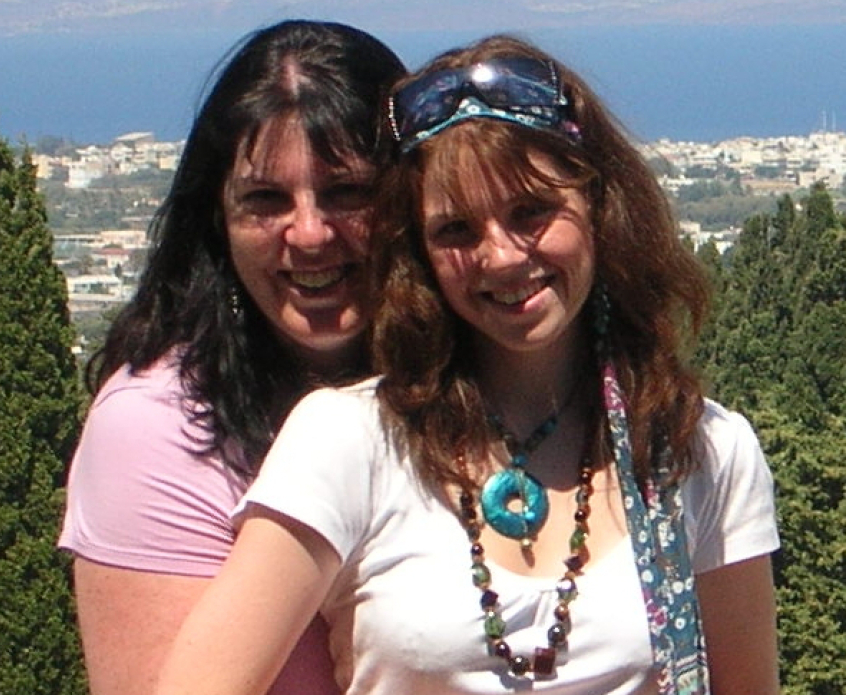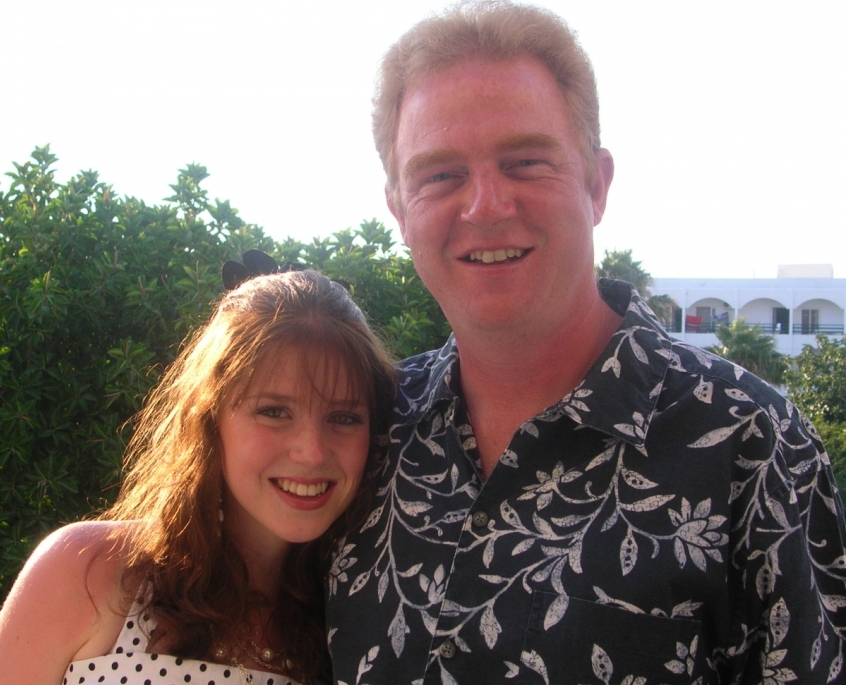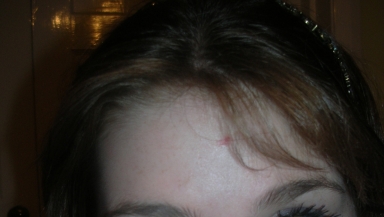At the age of 14, Lizzie McNaught nearly died of anorexia nervosa – she was hospitalised for five months. Now aged 25, Lizzie is a junior doctor and is passionate about educating people better about eating disorders.
Lizzie's own battle with anorexia began when she had a horse riding accident aged 13, which led to 6 weeks off school in a leg brace. Having found comfort in food during this lonely and inactive time at home, she returned to school a bit heavier, and was victimised and bullied as a result. Desperate to be accepted and included, she decided the only way to achieve this was through a very strict diet – and the desire to lose weight gradually took over her mind and her life...
The story of her journey with anorexia – Life Hurts – is published today at the start of Eating Disorders Awareness Week and this is an extract.

Through my therapy, I began to think differently about what was important in my life. And, most of all, I began to see how my faith in God could change my perception of myself, and the world around me. For too long I had been focused on food and weight, as if that was all that life was about, but now I began to gain insight into the fact that, in God's eyes, those issues were tiny compared to the opportunities to live for him and make a difference in the world. I began to see that if God loved me whatever I was like, then what would it matter whether other people liked me or not. Gradually, I even began to learn how I might be able to love myself again. I began to change my focus from the weight I could lose in my body to the good I could do in the world. I began to regain a positive vision for my life. And I recognised that I could not achieve anything of any value if I kept starving myself.

At last, I was making progress. But, alas, just as I could see a way forward, it was cut short. Having reached the target in order to start CBT, this also meant that I was approaching the weight to be discharged. That should be good news, because I could be out, I could be free. But for me it was also bad news, because I discovered that as soon as I was discharged, I could no longer have the therapy sessions. I was devastated by this and so were my parents. Despite all the hopes and promises of getting well I was still gripped by anorexia.
Transforming Disease
As I look back on my journey through anorexia, I recognise that there were three important sources of help that made a great difference to me: the professional care, my faith, and the support of my family. Regarding my family, without a doubt, one of the most important factors in my journey was the encouragement that my mum always provided. So many times she used to tell me, 'Lizzie, you are going to recover.' She believed in me. She affirmed me. She did everything she could to help me to see the future that was possible if I could beat this dreadful disease.

So it was that she booked theatre tickets for the very night I was discharged from Leigh House. This time it was the musical Chitty Chitty Bang Bang. Mum knew that I would love the show because it was musical theatre. She wanted me to see immediately the wonderful possibilities for my life beyond anorexia. She hoped that, rather than moving backwards in my mind, as I had that time, I would now be encouraged to move forward and get on with my life. And I was. I wanted to be a new, healthy Lizzie. I wanted to put into practice some techniques I had learned from CBT. I wanted to conquer anorexia.
That night after the show, Mum hardly slept, as she prayed for me at this crucial stage. Would I go back to my old ways as too many did? Or would I keep moving forward to beat the disease?
Being back in the hurly-burly of a big school was a shock to the system. This impacted my eating and, although I was fighting back against the anorexia as best I could, my weight began to drop. Within a few weeks, we were told that, once again, it wasn't safe for me to be at school so it was arranged for me to have work sent home, where I could self-study. And that's what I did for the whole of that academic year. Mum and Dad arranged for a private English and maths tutor once a week, and my work was marked by teachers at the school, but apart from that I studied on my own at home. And I did work hard; I was determined to catch up and do the best I could in my GCSEs.
It was at this time that I also particularly valued the power of a moderated message board for people living with anorexia. This disease is very isolating in so many ways. The dishonesty and deception can cut you off from those closest to you. The consequences, as in my case, can be separation from school and other social environments. So, it is not surprising that many people living with anorexia turn to the web and social media. This can have a negative or a positive impact. There are websites and networks, often referred to as 'pro-ana', 'pro-mia' or 'anamia', which seek to promote thinness, equating it with self-control and beauty, and often using quasi-spiritual messages to encourage users to strive for weight loss, endorsing it as a valid way of life. These are deeply dangerous. But there are also websites and networks that can genuinely help those living through eating disorders, and the evidence shows that, properly run, they can have a significant positive impact. They can enable people to help themselves with or without clinical interventions. They circumvent the barriers that hinder people from seeking clinical help, and they allow the person to control their own support. In technical terms, they facilitate 'proactive self-care'.
One of these networks is the message boards run by the charity Beat. This is a forum providing asynchronous discussion in conversational threads. It is moderated by the Beat team to ensure that all posts are in line with their four published criteria: 'keeping safe online, posting mindfully, posting respectfully and posting responsibly'. And I found it immensely helpful, especially as I spent most of this year out of school.
Once again, as in my other positive experiences of professional support, the key was the genuine humanity of the people involved. The moderating team didn't act like cyber robots; they were real people who demonstrated a genuine compassion. In one of my early posts, I poured out my heart about the struggles I was experiencing at the time. I can't remember exactly what I said, but it clearly was inappropriate. In my desire to express myself I probably said things that would be unhelpful to others. So, of course, the moderators would not let it appear on the site. But they didn't just delete it and move on. In fact, they took the trouble to contact me directly, and talk with me. It made a real difference to my situation at that moment, and opened the door for many subsequent interactions online, as other people helped me. And I even began to help others.
This was another key moment of insight for me, as I began to see how the bad things that had happened in my life could be used for good in other people's lives. My dad had often expressed his belief about the relationship between faith and suffering. He said that, as he understands it, 'God doesn't usually take away suffering, instead he transforms it into something far better than we could ever have imagined.' Now I was beginning to see how that could be possible in my life.
Indeed, Dad also helped me to recognise that no matter how weak you are, God can still use you to help others. He often talked about his own father's death. I never knew this grandfather, he died of cancer before I was born. His final weeks were spent at home, being cared for by friends and family who were nurses. One of these was my Aunty Gill, for whom faith had not been easy, but being with Dad's father as he died had a transformational impact on her. Shortly before he passed away, he said, 'Cry for yourselves, because you are going to miss me. But don't cry for me, because I am looking forward to going to be with God.' And his quiet, confident faith helped my aunty to move forward in her own faith. In my work as a doctor I have cared for people as they are dying of cancer, and in those last hours they are extremely weak, as the body closes down. In fact, it is hard to imagine any greater frailty than that of a person in such a situation. And yet, in that position of extreme weakness, Dad's father had helped my aunty. My ongoing fragility, as I continued to struggle with the anorexia, was much less than my grandfather's. So, if God could use him to help others, surely he could use me too.
Extracted with permission from 'Life Hurts' by Dr Elizabeth McNaught, published by Malcolm Down Publishing.













